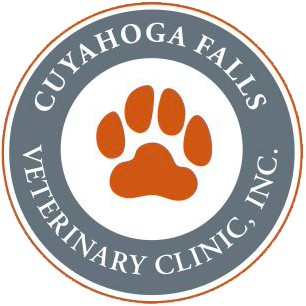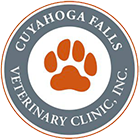Has one of your pets been diagnosed with Chronic Kidney Disease? Chronic Kidney Disease is becoming one of the more common end-of-life problems that our pets, especially our cat friends, struggle with. We definitely see our fair share of kidney disease patients at the Cuyahoga Falls Veterinary Clinic. But with the diagnosis of kidney disease comes a number of questions:
*What is chronic kidney disease?
*How do pets get chronic kidney disease?
*What is the difference between chronic kidney disease and chronic renal failure?
Let’s start by talking about what the kidneys are and what their job is within the body. The primary role of the kidneys is to filter the blood. The kidneys are also responsible for producing a number of important hormones in the body, including the hormone that initiates the production of  Red Blood Cells and a hormone that impacts blood pressure. A healthy kidney is represented on the left in the photo. The kidneys are actually pretty tough little organs. They can sustain injury and perform their function even if they lose more than half of their original healthy tissue. (This is why a person can donate a kidney and still lead a great, healthy life!)
Red Blood Cells and a hormone that impacts blood pressure. A healthy kidney is represented on the left in the photo. The kidneys are actually pretty tough little organs. They can sustain injury and perform their function even if they lose more than half of their original healthy tissue. (This is why a person can donate a kidney and still lead a great, healthy life!)
There comes a time, though, after there is sufficient injury to the kidneys, that they simply can’t keep up with their job. A diseased kidney is represented on the right side of the photo. Once the threshold of around 75% of lost kidney tissue has been crossed, the kidneys cannot sufficiently filter the blood. (In some cats this threshold is even greater, which makes predicting how much quality of life they can be given with treatment very, very difficult.) As the disease progresses, the kidneys lose the ability to produce the important hormones that the body needs. As a result, the toxins that the kidneys used to filter out of the blood and into the urine begin to build up in the blood (called uremia), causing the pet to feel sick, lose their appetite, vomit, develop oral ulcers, and become weak and lethargic.
There can be a variety of potential causes for chronic kidney disease.  Toxin exposure, urinary obstruction and normal wear-and-tear are three of the more common reasons that we see. It can often be difficult to pinpoint the exact cause of kidney disease, though, because the bulk of the injury could have occurred well before the pet’s initial illness and presentation. (Recall the ~/>75% threshold.)
Toxin exposure, urinary obstruction and normal wear-and-tear are three of the more common reasons that we see. It can often be difficult to pinpoint the exact cause of kidney disease, though, because the bulk of the injury could have occurred well before the pet’s initial illness and presentation. (Recall the ~/>75% threshold.)
Chronic kidney disease (a.k.a. chronic renal failure) is diagnosed by performing routine bloodwork and it can be further analyzed by urinalysis, radiographs and ultrasound. By definition, this threshold described above has been crossed when the kidney markers on a blood chemistry profile are elevated.
The kidney markers that we evaluate are the BUN (Blood Urea Nitrogen), Creatinine, Phosphorus, Potassium (all seen below), and the Red Blood Cell count.
 While the treatment options on the human side of kidney disease involve transplantation and/or dialysis, these are very, very, very rarely pursued on the veterinary side.
While the treatment options on the human side of kidney disease involve transplantation and/or dialysis, these are very, very, very rarely pursued on the veterinary side.
The treatment of choice for cats and dogs is three-fold:
1) A diet that is low in protein and salt (the two things that the kidneys struggle to work with) is chosen and fed. Sometimes our pets enjoy this diet, other times they don’t, but it’s the best first place to start. Our diet of choice is Hill’s Prescription Diets for Dogs and Cats, though there are other comparable diets available.
2) Fluid therapy is very helpful. A separate treatment from dialysis, fluids can be given to cats and dogs right underneath their skin (if they are not significantly dehydrated) which they’ll absorb over time and use to dilute the abnormalities that build in the blood. The amount of fluids given and the frequency of treatments is entirely dependent upon the patient and how they are responding to treatments.
3) Supplement/medical therapy to bind elevating toxins and limit their damage within the body. Some of these are very helpful for particular patients while other patients seem to not respond as well as we’d like.
Unfortunately, chronic kidney disease cannot be cured. Upon diagnosis, the goal shifts to managing kidney disease and maximizing the quality-of-life of the patient, your pet. Managing chronic kidney disease is easier when it is caught early on in the process rather than late. Routine screening in senior patients is so important in maintaining health. Should kidney disease show up, we have significant experience treating it in both cats and dogs and we welcome the opportunity to care for your pet and provide the help that they need and deserve.
If your pet is showing any of the symptoms described above, or if your pet is older and hasn’t been seen by a veterinarian in quite some time, give us a call at 330-929-3223 so we can establish a baseline and provide the care that your pet deserves.


The Cuyahoga Falls Veterinary Clinic | Animal Wellness | Medical Services | Pet Services
[…] Chronic Kidney Disease […]
The Cuyahoga Falls Veterinary Clinic | Animal Wellness | Medical Services | Pet Services
[…] had heard somewhere about raisins AND grapes causing acute Renal failure but hadn’t seen any formal paper on the subject. We had her bring the dog in immediately. In […]
The Cuyahoga Falls Veterinary Clinic | Animal Wellness | Medical Services | Pet Services
[…] treatment be desirable? One of the tricky things with hyperthyroidism is that it can mask kidney disease. When unhealthy kidneys are forced to work on overdrive by an overactive thyroid gland, kidney […]
The Cuyahoga Falls Veterinary Clinic | Animal Wellness | Medical Services | Pet Services
[…] doctors are not comfortable providing dental care to patients, or offering surgical services, or interpreting laboratory tests. This can be okay, provided the doctor is complete in the history-taking and physical examination […]
The Cuyahoga Falls Veterinary Clinic | Animal Wellness | Medical Services | Pet Services
[…] level of the kidney, preventing the kidneys from effectively filtering the blood. This causes acute kidney failure, where toxins to build up in the blood, and the patient becomes sick, loses the appetite & […]
Mary Atkinson
Dr. Gates,
Thank you for your call regarding Two’s,our tuxedo cat diagnosis.She has given us eighteen years of love, laughter and joy. We certainly hope the hyperthyroidism is the treatable problem and not kidney disease.
We will be in tomorrow to pick up her medication. Again, thank you. Mary and Tim Atkinson.